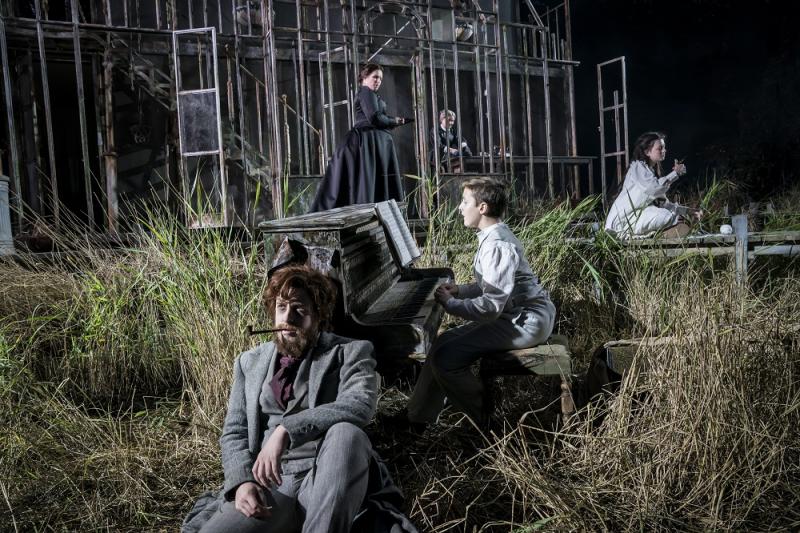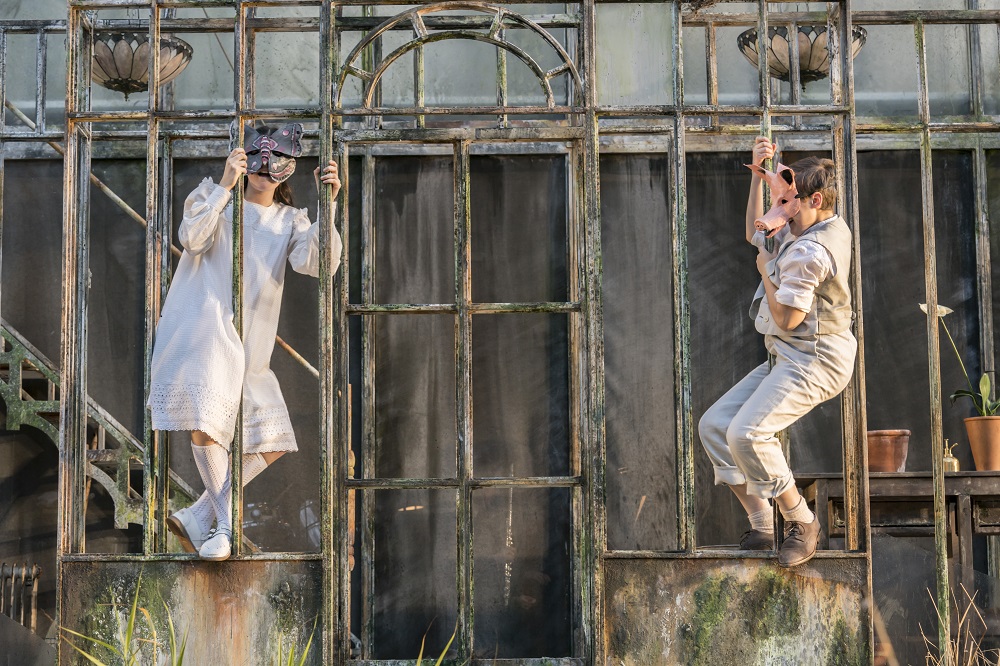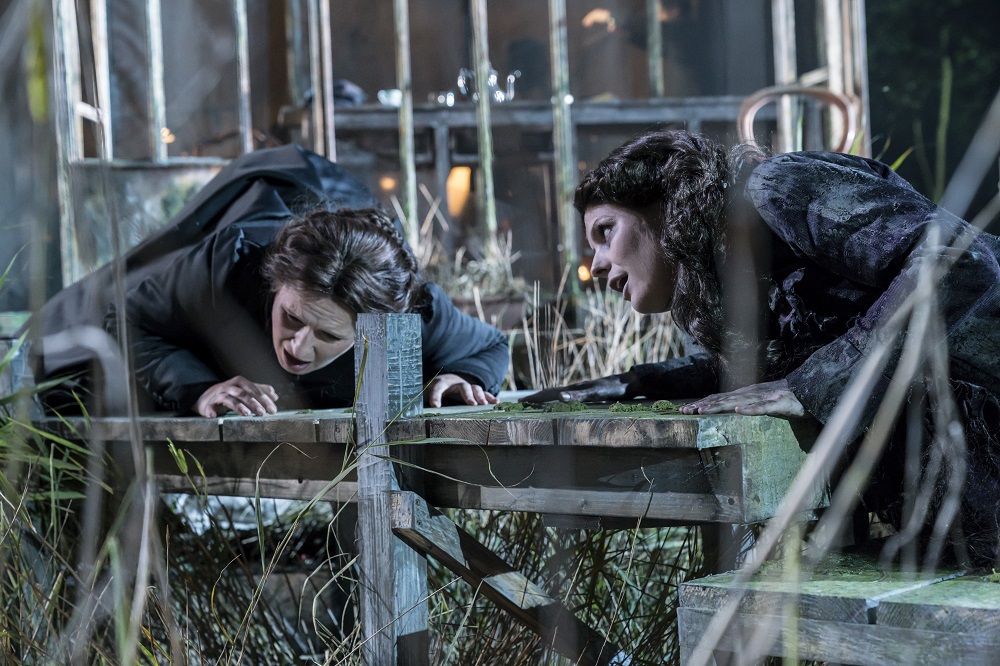The Turn of the Screw, ENO, Regent's Park Open Air Theatre review - one dimension, not four | reviews, news & interviews
The Turn of the Screw, ENO, Regent's Park Open Air Theatre review - one dimension, not four
The Turn of the Screw, ENO, Regent's Park Open Air Theatre review - one dimension, not four
Atmospheric setting, solid singing but no flesh creep

Opera and music theatre have set the birds shrilling in Regent's Park before in the shape of Gershwin's Porgy and Bess – a very forgettable production – and Sondheim's Into the Woods – much better, and a score which can give any 20th century opera a run for its money in terms of thematic interconnection.
It could have been a lot spookier if the ghosts of Bly – possibly a figment of the overwrought Governess's imagination in Henry James's ever-fascinating novella, given voices in Myfanwy Piper's occasionally infelicitous libretto for Britten – had kept their distance. How eerie they looked across the reed beds behind the decayed greenhouse-manor of Soutra Gilmour's splendid designs, but they never got to sing from there; how all too corporeal they were, complete with whiteface make-up, moving behind (craned necks from the spectators) and between the audience. No doubt their former selves, the valet Peter Quint and the previous governess Miss Jessel, had been up to no good with the children (Elen Willmer and Daniel Alexander Sidhom, pictured below) – very bad, in fact, though what exactly is never made explicit by James – but there still needs to be a layer of ambiguity about how they enter into the inexperienced new Governess's mind, hungry as she seems to be for Gothick romance.  A subtle production can still just about keep this element in play, but Timothy Sheader's one-dimensional rendering wasn't it. The often unsatisfactory amplification would have allowed the ghosts to be heard from the distance they rarely kept. Could the opera have done without it had the excellent 13-piece ENO ensemble under company-trained conductor Toby Purser been in a kind of pit in front of the action rather than tucked away in the house behind it, like ghost inhabitants themselves in the first half, but again all too visible beneath ceiling lamps once it got darker, as if they were giving a country-house concert? With players as good as these, and the incredible solos Britten gives to each and every one of them, a flattening of timbre in the miking was inexcusable. Some, like the horn, could sound too boomy; others – the crucial piano – were barely audible at times. Still, the co-ordination was better than it had a right to be under the circumstances.
A subtle production can still just about keep this element in play, but Timothy Sheader's one-dimensional rendering wasn't it. The often unsatisfactory amplification would have allowed the ghosts to be heard from the distance they rarely kept. Could the opera have done without it had the excellent 13-piece ENO ensemble under company-trained conductor Toby Purser been in a kind of pit in front of the action rather than tucked away in the house behind it, like ghost inhabitants themselves in the first half, but again all too visible beneath ceiling lamps once it got darker, as if they were giving a country-house concert? With players as good as these, and the incredible solos Britten gives to each and every one of them, a flattening of timbre in the miking was inexcusable. Some, like the horn, could sound too boomy; others – the crucial piano – were barely audible at times. Still, the co-ordination was better than it had a right to be under the circumstances.
Two casts are alternating, so you may have, or have had (press night was the fourth performance of nine), a very different experience from yesterday evening's. I somehow doubt that Sheader's approach would allow much more dramatic range than Anita Watson's Governess provided. Hers is a gorgeous, liquid lyric soprano, with or without amplification, and the early stages showed so much promise, Purser giving Watson plenty of space to float her doubts and raptures. But though her over-reactions to the narrative of housekeeper Mrs Grose (Janis Kelly, focused and perfect as far as the role allows) over past events and to the children's behaviour flashed warning signals, the sense of her being possessed in the drive for possession never quite emerged in the second act. Put that down to unhelpfully diffuse staging of the scenes where she pushed young Miles to the brink of confession. Even the final gesture was puzzling: why evade the obvious fade-out on the stricken women cradling – spoiler alert – the body of the dead boy with nothing better than her move down the walkway to crumple right in front of the audience?  The tenors alternate roles. Last night William Morgan delivered the Prologue crisply, starting in the stalls, but without the close fusion needed with the distant piano, and Elgan Llŷr Thomas sang elegantly, but without the other-worldliness needed for the "depraved" Quint (the make-up and a bad red beard didn't help). More charismatic, Elin Pritchard's Miss Jessel set up the grand-opera duel with the present Governess in the schoolroom superbly (pictured above), but was again hampered by closeness to the audience. Sterling work from the two children, here Daniel Alexander Sidhom and Elen Wilmer, left some room for doubt over what they knew and saw, but it seemed as if Sheader couldn't quite make up his mind over that one, with a bit of overplaying the hand in what should be the night scene that ends Act One.
The tenors alternate roles. Last night William Morgan delivered the Prologue crisply, starting in the stalls, but without the close fusion needed with the distant piano, and Elgan Llŷr Thomas sang elegantly, but without the other-worldliness needed for the "depraved" Quint (the make-up and a bad red beard didn't help). More charismatic, Elin Pritchard's Miss Jessel set up the grand-opera duel with the present Governess in the schoolroom superbly (pictured above), but was again hampered by closeness to the audience. Sterling work from the two children, here Daniel Alexander Sidhom and Elen Wilmer, left some room for doubt over what they knew and saw, but it seemed as if Sheader couldn't quite make up his mind over that one, with a bit of overplaying the hand in what should be the night scene that ends Act One.
On the plus side in the space's mixed blessings were fabulous improvised avian obbligatos throughout Act One: parakeets squawking warnings, the cawing of a crow, a blackbird striking up to Quint's arabesques – I assume not a pre-recorded one, though it was right next to a microphone. And when the Governess sang, in the most concordant scene of the opera to our setting, how "the birds fly home to those great trees," they duly obliged. Drawbacks were havoc with the atmosphere of night and day scenes, for all the excellence of Jon Clark's lighting, and too great an awareness of one's fellow audience members. A perfect midsummer evening's pleasure, then, but no flesh creep.
Add comment
The future of Arts Journalism
You can stop theartsdesk.com closing!
We urgently need financing to survive. Our fundraising drive has thus far raised £49,000 but we need to reach £100,000 or we will be forced to close. Please contribute here: https://gofund.me/c3f6033d
And if you can forward this information to anyone who might assist, we’d be grateful.

Subscribe to theartsdesk.com
Thank you for continuing to read our work on theartsdesk.com. For unlimited access to every article in its entirety, including our archive of more than 15,000 pieces, we're asking for £5 per month or £40 per year. We feel it's a very good deal, and hope you do too.
To take a subscription now simply click here.
And if you're looking for that extra gift for a friend or family member, why not treat them to a theartsdesk.com gift subscription?
more Opera
 Cinderella/La Cenerentola, English National Opera review - the truth behind the tinsel
Appealing performances cut through hyperactive stagecraft
Cinderella/La Cenerentola, English National Opera review - the truth behind the tinsel
Appealing performances cut through hyperactive stagecraft
 Tosca, Royal Opera review - Ailyn Pérez steps in as the most vivid of divas
Jakub Hrůša’s multicoloured Puccini last night found a soprano to match
Tosca, Royal Opera review - Ailyn Pérez steps in as the most vivid of divas
Jakub Hrůša’s multicoloured Puccini last night found a soprano to match
 Tosca, Welsh National Opera review - a great company reduced to brilliance
The old warhorse made special by the basics
Tosca, Welsh National Opera review - a great company reduced to brilliance
The old warhorse made special by the basics
 BBC Proms: The Marriage of Figaro, Glyndebourne Festival review - merriment and menace
Strong Proms transfer for a robust and affecting show
BBC Proms: The Marriage of Figaro, Glyndebourne Festival review - merriment and menace
Strong Proms transfer for a robust and affecting show
 BBC Proms: Suor Angelica, LSO, Pappano review - earthly passion, heavenly grief
A Sister to remember blesses Puccini's convent tragedy
BBC Proms: Suor Angelica, LSO, Pappano review - earthly passion, heavenly grief
A Sister to remember blesses Puccini's convent tragedy
 Orpheus and Eurydice, Opera Queensland/SCO, Edinburgh International Festival 2025 review - dazzling, but distracting
Eye-popping acrobatics don’t always assist in Gluck’s quest for operatic truth
Orpheus and Eurydice, Opera Queensland/SCO, Edinburgh International Festival 2025 review - dazzling, but distracting
Eye-popping acrobatics don’t always assist in Gluck’s quest for operatic truth
 MARS, Irish National Opera review - silly space oddity with fun stretches
Cast, orchestra and production give Jennifer Walshe’s bold collage their all
MARS, Irish National Opera review - silly space oddity with fun stretches
Cast, orchestra and production give Jennifer Walshe’s bold collage their all
 Káťa Kabanová, Glyndebourne review - emotional concentration in a salle modulable
Janáček superbly done through or in spite of the symbolism
Káťa Kabanová, Glyndebourne review - emotional concentration in a salle modulable
Janáček superbly done through or in spite of the symbolism
 Buxton International Festival 2025 review - a lavish offering of smaller-scale work
Allison Cook stands out in a fascinating integrated double bill of Bernstein and Poulenc
Buxton International Festival 2025 review - a lavish offering of smaller-scale work
Allison Cook stands out in a fascinating integrated double bill of Bernstein and Poulenc
 Tosca, Clonter Opera review - beauty and integrity in miniature
Happy surprises and a convincing interpretation of Puccini for today
Tosca, Clonter Opera review - beauty and integrity in miniature
Happy surprises and a convincing interpretation of Puccini for today
 Hamlet, Buxton International Festival review - how to re-imagine re-imagined Shakespeare
Music comes first in very 19th century, very Romantic, very French operatic creation
Hamlet, Buxton International Festival review - how to re-imagine re-imagined Shakespeare
Music comes first in very 19th century, very Romantic, very French operatic creation
 Falstaff, Glyndebourne review - knockabout and nostalgia in postwar Windsor
A fat knight to remember, and snappy stagecraft, overcome some tedious waits
Falstaff, Glyndebourne review - knockabout and nostalgia in postwar Windsor
A fat knight to remember, and snappy stagecraft, overcome some tedious waits

Comments
I read the ending as an
Yes, that was suggested. But
Yes, that was suggested. But Miss Jessel didn't drown in the lake ('she went away to die'), and the Governess lived to write the story. Maybe I'm being too literal. But it didn't quite read - instead it seemed callous of the Governess to walk away from the newly-dead child.
Although the implication from
But that was addressed very
But that was addressed very explicitly to Quint.
Actually, it wasn’t. Miles
So you're saying you saw the
So you're saying you saw the other cast? Not so the night I went. Actually it would be interesting if a director gave a different interpretation with a different Governess. That might encourage people to go twice... I'm well aware of the different possibilities; I just felt the outlines weren't strong enough one way or another.